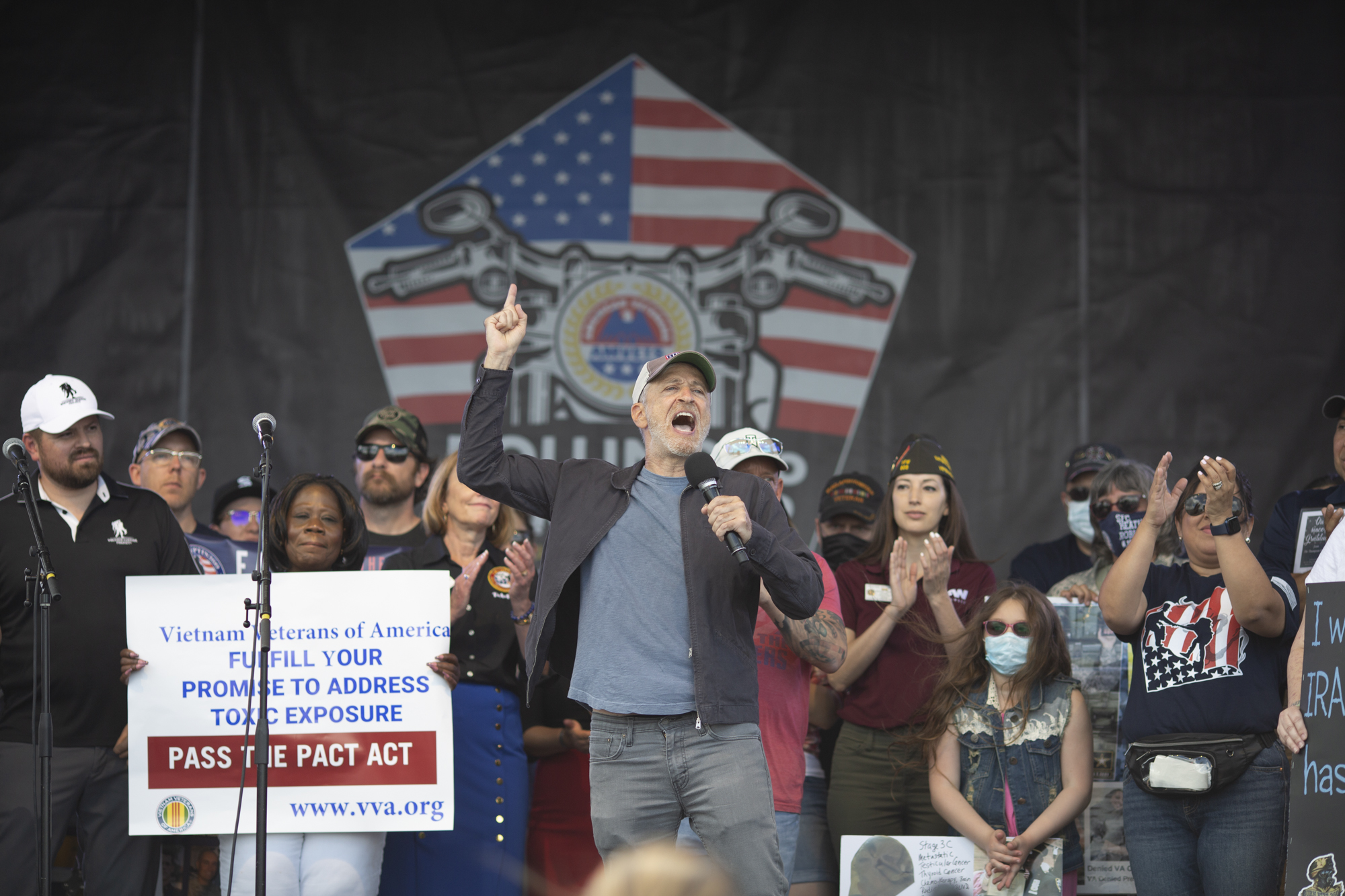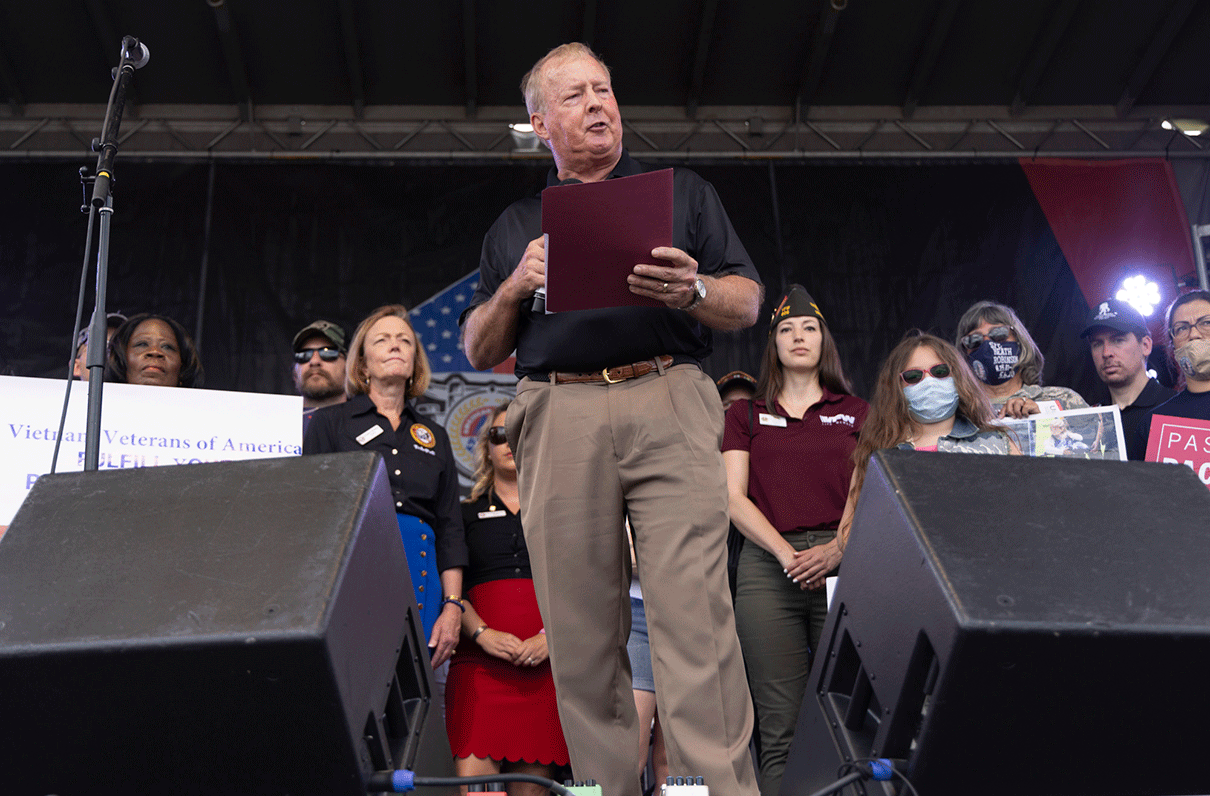The Military Officers Association of America rallied with several veteran service organizations Saturday in Washington, D.C., to make a final push for sweeping toxic exposure reform that will benefit millions of veterans.
The hourlong event was part of AMVETS’ Rolling to Remember events tied to Memorial Day weekend and culminated with a fiery speech by former Daily Show anchor and veterans advocate Jon Stewart.
If passed, the Sergeant First Class Heath Robinson Honoring Our Promise to Address Comprehensive Toxics (PACT) Act of 2022 would add nearly two dozen toxic exposure-related conditions to VA’s list of service presumptions. It would also make more than 3.5 million Post-9/11 combat veterans exposed to burn pits eligible for VA health care; expand presumptions, including hypertension, for Vietnam War veterans; and expand benefits to Vietnam veterans exposed to Agent Orange while deployed to Thailand, Laos, Cambodia, and Guam.
[TAKE ACTION ON THE PACT ACT: Send a Message | Make a Call]
The Senate is expected to vote on the bill the week of June 6, according to bill co-sponsors Sens. Jon Tester (D-Mont.) Jerry Moran (R-Kan.), the chair and ranking member, respectively, of the Senate Veterans' Affairs Committee. If passed, the bill will have to be voted on by the House of Representatives, which passed similar toxic exposure-related legislation earlier this year.
In addition to MOAA and AMVETS, other VSOs participating in the rally were: Veterans of Foreign Wars (VFW), Disabled American Veterans (DAV), Reserve Organization of America (ROA), Vietnam Veterans of America (VVA), Iraq and Afghanistan Veterans of America (IAVA), Wounded Warrior Project, and Burn Pits 360.
“The reason you’re seeing such unity is that one in five veterans will be helped by this bill,” MOAA President and CEO Lt. Gen. Dana T. Atkins, USAF (Ret), told the crowd Saturday. “To put it in another way, that’s 3.5 million veterans … exposed to toxins in the course of their service. We have been working together to get this bill signed into law and we can’t stop now.”
During his speech, Stewart praised the collaboration of the VSOs while compelling the attendees and the thousands of viewers watching online to take action.
“We are six senators away,” Stewart said. “Three years ago, [you] had nothing. And it’s because of their dynamic effort and unprecedented show of unity and working together.”
Veterans came from all over the United States to attend the rally, including Ohio, Georgia, and Maryland. Retired Army Sgt. Michael Lieske came down from Baltimore; Since retiring medically from the Army in 2017 due to a brain tumor, Lieske has been active in his local VFW.

After fighting on Capitol Hill for 9/11 responders' health benefits, Jon Stewart is now working to support our veterans exposed to toxins. (Photo by Mike Morones/MOAA)
“In recent years, I became more and more into advocating for veterans’ benefits,” Lieske said.
First Sgt. Robert DeVere, USA (Ret), drove his motorcycle up from Winder, Ga., to attend the weekend’s events, which include a motorcycle ride through Washington, D.C. on Sunday. DeVere joined the military in 1972 and knew two Vietnam veterans who suffered and died from complications related to Agent Orange.
Amelia Stanley and her son Harrison drove from Cincinnati to attend the rally. Amelia is the wife of Maj. Jason Stanley, a special operations pilot in the Air Force who succumbed to brain cancer last month. The cancer was believed to be caused by his exposure to burn pits in both Iraq and Afghanistan.
[RELATED: Retired Air Force Pilot, Family Spent His Final Days Fighting for VA Care]
Amelia said she came to support the bill for many reasons, including the stigma veterans have for seeking help on their own. Frequent nose bleeds and sinus issues began soon after her husband's deployments, followed by cognitive issues and eventually a seizure that left him partially paralyzed in 2021.
“We know [veterans] need to be stoic, that is part of their mission because they can’t do their jobs if they are worried about their health,” said Stanley. “That’s why we’re here, to make sure we have their back.”
More Members Mean More Influence Over Our Health Care
Get involved and make sure your interests are addressed. Because the larger our voice is, the greater our impact will be.

